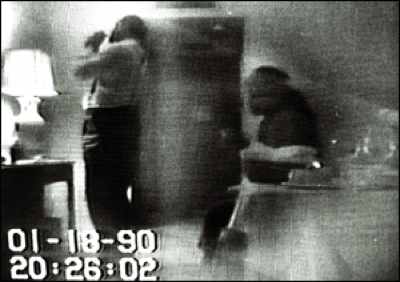 Crime
Crime  Crime
Crime  Animals
Animals The Animal Kingdom’s 10 Greatest Dance Moves
 Movies and TV
Movies and TV 10 Box Office Bombs That We Should Have Predicted in 2025
 History
History 10 Extreme Laws That Tried to Engineer Society
 History
History 10 “Modern” Problems with Surprising Historical Analogs
 Health
Health 10 Everyday Activities That Secretly Alter Consciousness
 History
History Top 10 Historical Disasters Caused by Someone Calling in Sick
 Animals
Animals 10 New Shark Secrets That Recently Dropped
 Movies and TV
Movies and TV 10 Forgotten Realities of Early Live Television Broadcasts
 Technology
Technology 10 Stopgap Technologies That Became Industry Standards
 Crime
Crime 10 Dark Details of the “Bodies in the Barrels” Murders
 Animals
Animals The Animal Kingdom’s 10 Greatest Dance Moves
 Movies and TV
Movies and TV 10 Box Office Bombs That We Should Have Predicted in 2025
Who's Behind Listverse?

Jamie Frater
Head Editor
Jamie founded Listverse due to an insatiable desire to share fascinating, obscure, and bizarre facts. He has been a guest speaker on numerous national radio and television stations and is a five time published author.
More About Us History
History 10 Extreme Laws That Tried to Engineer Society
 History
History 10 “Modern” Problems with Surprising Historical Analogs
 Health
Health 10 Everyday Activities That Secretly Alter Consciousness
 History
History Top 10 Historical Disasters Caused by Someone Calling in Sick
 Animals
Animals 10 New Shark Secrets That Recently Dropped
 Movies and TV
Movies and TV 10 Forgotten Realities of Early Live Television Broadcasts
 Technology
Technology 10 Stopgap Technologies That Became Industry Standards
10 Incredibly Controversial Sting Operations
A sting operation is defined as “a complicated confidence game planned and executed with great care (especially an operation implemented by undercover agents to apprehend criminals)” Stings are commonly used throughout the world by law enforcement and recently it has become very popular with news and media organizations including trashy tabloids as ways of getting sensational headlines. One of the big concerns surrounding these operations is whether or not they constitute entrapment. I am personally on the fence concerning the ethics of sting operations because I know it can be a great tool to catch violent criminals. This list looks at some of the more interesting and controversial sting operations. Please comment if you have any additional information on these or other stings and if you believe these techniques are ethical.

ACORN stands for Association of Community Organizations for Reform Now. ACORN was a collection of community-based organizations in the United States that advocated for low and moderate income families. They also provided information on voter registration and affordable housing. In 2009, selectively edited videos were released by two young conservative activists, James O’Keefe and Hannah Giles (shown above). The two dressed up like a pimp and prostitute and then used a hidden camera to elicit damaging responses from ACORN employees, that appeared to advise them how to hide prostitution activities and avoid taxes. The ACORN workers also didn’t seem to be put off by the request for help in getting financing for a brothel. This created a nationwide controversy, resulting in a loss of funding from government and private donors. On March 22, 2010, ACORN announced it was closing all remaining affiliated state chapters and disbanded due to falling revenue.
Interesting Fact: On January 25, 2010, James O’Keefe, along with three others, were arrested on felony charges for interfering with the phones of the New Orleans office of Democratic Senator Mary Landrieu. O’Keefe said he was investigating accusations that Landrieu’s office had ignored phone calls from constituents who were complaining about the health care debate. They were dressed as telephone repairmen as O’Keefe videotaped the operation. They were eventually charged with entering a federal building under false pretenses which is a misdemeanor. O’Keefe pled guilty and was sentenced to three years probation, 100 hours of community service, and a $1,500 fine.

This has been called the biggest undercover news story in Indian journalism. In 2001, a popular newspaper from India called Tehelka (meaning “sensation” in Hindi) launched its first major sting operation, “Operation West End” to expose the alleged culture of bribery at the India’s Ministry of Defense. The newspaper had two reporters pose as arms dealers from a bogus company in London. The undercover video shows several politicians and defense officials, including the secretary of the ruling party BJP, Bangaru Laxman, discussing and taking bribes for helping them procure government contracts. After the tapes were made public, Laxman and Defense Minister George Fernandes (shown above) resigned, and several additional defense ministry officials were suspended.
Interesting Fact: Instead of initially acting on the evidence from the sting operation, the Indian government accused the newspaper of fabricating the allegations. The main financial backers of Tehelka were made targets of investigations, and the newspaper company was almost ruined. In 2003, Tehelka was re-launched as a weekly newspaper, and was funded by faithful subscribers and other well-wishers. In 2007, Tehelka shifted to a regular magazine format.

On June 11, 2007, Idaho Senator Larry Craig was arrested by an undercover police officer who was conducting a sting operation against men cruising for sex at the Minneapolis-St. Paul International Airport. Arresting officer Sgt. Dave Karsnia said he went into a stall shortly after noon and closed the door. Craig then entered the stall next to him and put his luggage against the front of the stall door. This is often used as an attempt to conceal sexual conduct by blocking the view from the front. Minutes later, the officer said he saw Craig peering into his stall through a crack, then tapped his right foot several times and then moved it closer to Karsnia’s, until their feet touched. Craig then passed his hand under the stall divider into Karsnia’s stall with his palm up and guided it along the divider toward the front of the stall three times. Karsnia then waved his badge back, to which the senator responded, “No!” The senator pleaded guilty to disorderly conduct and paid a fine, but changed his mind after word of his arrest later became public. Craig claimed he just had a “wide stance”, and he only pleaded guilty to avoid a spectacle. When he tried to withdraw his guilty plea, an appeals court turned him down. Craig served out his Senate term and was unsuccessful to clear his name in the Senate Ethics Committee. Craig did not seek reelection in 2008 and left office on January 3, 2009.
Interesting Fact: Shortly after Craig was arrested, the men’s room became kind of a tourist attraction, with men and women asking directions and stopping to take pictures. Even toilet paper from the restroom was offered on E-Bay. You can listen to Sgt. Karsnia and Senator Craig’s conversation right after the arrest here.

In May of 2010 Sarah Ferguson fell prey to Mazher Mahmood, a journalist for the tabloid newspaper “News of the World”. Mahmood posed as an international tycoon and was able to arrange a meeting with Ferguson. During the meeting, the Duchess was secretly videotaped and offered to connect the “tycoon” with the powerful inner circle of her ex husband, Prince Andrew. On the tape Sarah Ferguson is heard saying “500,000 pounds when you can, to me, open doors.” She is also seen taking away a briefcase containing $40,000 in cash. Ferguson‘s spokesman said she was both “devastated” and “regretful” after the reporting of the incident. She also said in an interview with Oprah Winfrey that she had been drinking prior to soliciting the cash, and was “in the gutter at that moment”.
Interesting Fact: The man who posed as the tycoon, Mazher Mahmood, is known as the “Fake Sheikh” and has hoodwinked dozens of celebrities. He keeps his identity as mysterious as possible, and no one is sure if that’s his real name or what his real background is. The journalist claims to have received many death threats, does not appear in public, and has never allowed his face to appear in any of his stories.

The first bait cars were used in the 1990s by the Minneapolis Police Department. Today the largest bait car fleet in North America is based in Surrey, British Columbia, which is known to many as the “car theft capital of North America”. The vehicles are specially modified, with audio/video surveillance and GPS tracking technology, and can be remotely controlled to disable the engine. Since 2004, when it was launched in Surrey, BC, it has contributed to a 47% drop in auto theft. One of the more controversial bait cars stings occurred in 2008, in Dallas TX, when a woman was killed almost instantly when a thief, driving a bait car slammed into her. The victim’s family was awarded $245,000 to settle the lawsuit.
Interesting Fact: The key in deciding when police are using a bait car illegally, and would cause entrapment, is whether they leave it in such a state that would entice someone who would normally not commit a crime. You can watch one of the more colorful (to say the least) bait car stings here. I’m sure many will be thinking the same thing I was thinking. “Where the heck was the kill switch?”

Marion Barry is a well known politician and long-time mayor of Washington D.C. On December 22, 1988, police officers were about to make an undercover drug buy from Charles Lewis, a former Virgin Islands official, and were called back when they learned that Mayor Marion Barry was in Lewis’s hotel room. This led to a grand jury investigation into possible interference, by the mayor, in the drug investigation. Barry appeared before the grand jury and testified for three hours and later told reporters he had done nothing wrong. Then, on January 18, 1990, the FBI and D.C. Police set up a sting operation and arrested Barry in a Washington D.C. Hotel, after he smoked crack cocaine in a room with his former girlfriend, who had become an FBI informant. It was there that Barry said the now famous words that are often associated with him; “Bitch set me up”. As a result of his arrest and the ensuing trial, Barry decided not to seek reelection as mayor. A grand jury returned 14 counts against him, including possible perjury before a grand jury. If convicted on all 14 counts, the mayor could have faced 26 years in jail. The jury only found Barry guilty of cocaine usage and he was sentenced to six-months in prison. After Barry was released from jail he ran for city council. Because of the feeling by many that the government was just out to get Marion Barry, along with his general popularity; he received 70 percent of the vote. Then, in 1995, Barry was elected Mayor of Washington DC for the fourth time. Today, Barry is back serving on the D.C. city council.
Interesting Fact: Whatever you think of Marion Barry you have to admire his tenacity, and his passion for serving the people of D.C. The incident above is just a small chapter in his fascinating life. Last year HBO made a documentary called “The Nine Lives of Marion Barry,” You can watch the trailer here.

Joran Van der Sloot is a Dutch national who is a prime suspect relating to the disappearance of Natalee Holloway, who has been missing since May 30, 2005, during a high school graduation trip in Aruba. The case was revived on March 29, 2010 when Van der Sloot contacted John Q. Kelly, legal representative of Holloway’s mother Beth Twitty. Van der Sloot offered to reveal information around the circumstances of Holloway’s death, and the location of her body, for a total $250,000 with $25,000 paid in advance. Kelly and Twitty contacted law-enforcement authorities in Alabama, and the FBI set a sting operation into motion. On May 10, Van der Sloot accepted the amount of $15,000 by wire transfer to his account in the Netherlands, and then another $10,000 was paid to him in cash. In exchange for the money, he took Kelly on a drive to show where Holloway’s remains were. He pointed out a house and said his father had helped dispose of the body in the foundation. This turned out to be false because the house was not built when Holloway disappeared. Later Van der Sloot told Kelly in an e-mail that it was all a hoax. At this point Van der Sloot could have been arrested for wire fraud and extortion, but authorities delayed the arrest because they were trying to build a murder case against him. Van der Sloot was not only left free, he was allowed to leave Aruba and use the money he received from the sting to go to Bogotá, Colombia, and then to Lima Peru. In a Casino hotel in Lima he met Stephany Flores Ramirez, a 21 year old business student at the University of Lima. Security video shows Van der Sloot and Ramirez entering a hotel room together, but only Van der sloot leaving. On June 2, Ramirez was found beaten to death, her neck broken, in the hotel room which was registered in Van der Sloot’s name. Ramirez died on May 30, 2010, exactly five years from Natalee Holloway’s disappearance. Van der Sloot was arrested On June 3, and on June 7, he confessed to the killing.
Interesting Fact: Van der Sloot is currently locked away in the Miguel Castro prison in Peru, where murder charges are filed. He reportedly now says he’ll reveal the location of Natalee Holloway’s body if he is allowed transfer to an Aruba jail.

Perverted-Justice in an organization that carries out sting operations by having volunteers pose as 10-15 year old minors on chat sites, and then wait for an adult to message or email the decoy back. If the conversation turns sexual in nature they will not discourage it or outright encourage it. Then they will try to identify the men by obtaining their telephone numbers and other details, so that a meeting can be arranged. The organization then passes the information on to law-enforcement. Perverted-Justice has also collaborated with an American reality program called “To Catch a Predator”. One of the more controversial cases occurred in 2006 in Murphy, Texas. Louis Conradt (Pictured above) was a district attorney in Texas, and posed as a 19-year-old university student and engaged in sexually charged online chats with someone who he believed was a 13-year-old boy. After Conradt asked for pictures of the boy’s penis, they brought in an actor to play the boy over the phone. When Conradt stopped responding to phone calls and instant messages, police and the reality show decided to bring the operation to Conradt’s home, with a search warrant. When officers moved in to make an arrest, they heard a gunshot. They found Conradt inside with a self-inflicted wound and he later died at a hospital.
Interesting Fact: The sting in Murphy, Texas, resulted in 23 arrests for on-line solicitation of a minor. In June, 2007, all 23 cases were not prosecuted due to insufficient evidence. Conradt’s family filed a suit against Dateline’s To Catch a Predator series for $105 million. The case was eventually settled out of court. In 2008 the network canceled production of all future episodes.

During a traffic stop in Tallahassee, Florida, on February 22, 2007, Rachel Hoffman (pictured above) was caught with 25 grams of marijuana. Then, on April 17, 2008, police searched her apartment and uncovered 151.7 grams of cannabis, and 4 ecstasy pills. She was reportedly told by police that she would go to prison unless she became an undercover informant for them. She was then sent, untrained, to an undercover meeting to buy a large amount of drugs and a handgun from two suspected drug dealers. While she was at the drug buy, the suspects changed the location of the buy. The policemen that were monitoring the sting, lost track of her when she left the buy spot with the two suspects in their car. While in transit, the two suspects executed her with the same gun she was supposed to buy. Her body was recovered two days later near Perry, Florida. On December 17, 2009, which would have been Rachel Hoffman’s 25th birthday, one of the murder suspects, was found guilty of first degree murder and sentenced to life imprisonment without parole. The second murder suspect is scheduled for trial in October 2010.
Interesting Fact: On May 7, 2009, a law called “Rachel’s Law” was passed by the Florida State Senate. Rachel’s Law requires law enforcement agencies to (a) provide special training for officers who recruit confidential informants, (b) instruct informants that reduced sentences may not be provided in exchange for their work, and (c) permit informants to request a lawyer if they want one.

Mr. Big is also called “the Canadian technique”, and was developed by the Royal Canadian Mounted Police in the early 1990s for unsolved homicides. It is used in Canada and Australia, but it is considered entrapment in many other countries, including the United States and England. The technique works something like this: An undercover police unit poses as members of a fictitious gang, into which the suspect is inducted. The suspect is invited to participate in a series of criminal activities (all faked by the police). In addition, the “gang members” build a personal relationship with the suspect, by drinking together and other social activities. After a period of time, he is introduced to Mr. Big, the gang leader. The suspect is told that the police have a renewed interest in the original crime, and to give the gang further details. They explain that Mr. Big may have the ability to influence the police investigation, but only if he admits all of the details of the crime. He is also told that he must be completely clear about any other past crimes, or the gang may not be willing to continue to work with him because he would become a liability. The photo above shows Royal Canadian Mounted Police during a memorial service, carrying the hats of four officers slain in Edmonton Canada, in 2005. Two of the men serving prison sentences for the murders made confessions to Mr. Big operatives.
Interesting Fact: In British Columbia, the technique has been used over 180 times, and, in 80% of the cases, it resulted in either a confession or the elimination of the suspect from suspicion. However, cases of false confessions and wrongful convictions have recently come to the public’s attention, and many are starting to question the controversial technique. In 2007, a documentary was made, called Mr. Big, that was very critical of the procedure. You can watch the trailer here.








